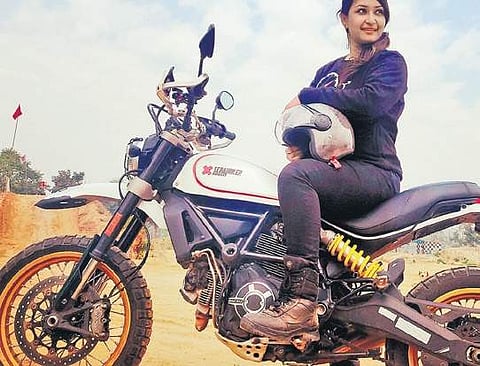

An ocean of women bikers claimed the roads during the Jashn e Azadi – The Great Freedom Ride organised by Nehru Bal Sangh, in honour of India’s 73rd Independence Day. We spoke to five about their riding experience, road safety and what needs to change for them to feel truly free, finds Ayesha Singh
Ambica Kaul, 23, PR professional
Kaul’s main purpose is to normalise the idea of women taking to motorcycles. “It may be a difficult statement to make, but not impossible. If enough of us join the riding crew, we will change perspicacity driven by obscure stereotypes.” Kaul believes that times are evolving and so is the culture girdling women bikers.
From the time when women were limited to household work to today’s role models such as Amelia Earhart (American aviator), Valentina Tereshkova (first woman in space), and Elizabeth Blackwell (first woman doctor), she believes a lot has changed.
“This Jashn-e-Azadi ride couldn’t have been possible a decade back but just see how many women participated in it now,” says Kaul, who learned to ride a month ago at the Eagle rider academy.
Bhavana Rana, 30, Advertising, Royal Enfield
Rana has been witnessing the effects of transformation in the increased number of women drivers. “This is progress, the benchmark of true aazadi.” But she doesn’t find Delhi roads safe at night.
“There are no fines for two-wheeler riders who drive without rearview mirrors. Even the Delhi Police doesn’t inspire confidence in me.
I find Gurgaon police more responsible. Having said that, I strongly believe that the pay grade of the police force needs to be revised.” Rana’s also witnessed authorities taking a biased stand in accidents involving women riders assuming it’s the girl’s fault.
“How can we encourage more women to take the road if the present situation is not promising,” questions Rana, who started riding at 16.
Neelam Parwani, 43, Alternate Healer
For the first time, she felt actively engaged in the celebration of Independence Day. From a notional viewpoint of what freedom means to engage with it proactively, she and her Royal Enfield classic 500 CC, made headlines during the Jashn e Azadi ride.
Road safety in an ongoing battle even today. “Accidents happen accidentally but catcalling and teasing is intentional.
Sometimes men will follow you or try to cut your lane. This leads to physical injury and a lot of emotional harassment,” says Parwani, who believes the unsafe riding culture won’t shift until we change mindsets.
“We also need more riding academies that facilitate women riders to learn, in addition to events that involve local crowd participation.”
Padmini Rawal, 38, Freelance Photographer
Rawal rode with a nationalistic fervency saluting her country. “I felt liberated, supported and motivated. This is what independence spells for me. To be able to express freely through words or your chosen vehicle.”
But Rawal is equally aware of the plenty of bias, street harassment and violation of road rules. You can bring about governmental intervention, strengthen laws or organise big fancy events promoting women’s riding, nothing will change till we teach ourselves to respect women, believes Rawal.
“We need to start educating our boys and men to look at women fairly and nonjudgmentally,” says the mother of two, who has been riding her Royal Enfield Thunderbird 500cc for six months.
Suparna Sarkar, 31, Motorcycle Trainer
Concerning Indian roads, unpredictability is rampant. One minute you feel safe and the other, you’re under threat.
“It’s not only humans that cause harm. Even stray cattle and dogs, poor road conditions with potholes, people not obeying traffic signals, driving recklessly on the wrong side driving, drinking and driving, use of mobile phones… all put the public at risk, especially bikers,” says the Gurgaon-based Sarkar.
The question that she gets a lot, puzzling her each time is being asked whose bike she’s riding. “This happens at petrol pumps and traffic signals.
People assume it’s my husband’s, father’s or brother’s.
Even within the house, men are readily taught how to ride while women are dismissed.” Through her association with EagleRider Academy, a motorcycle training school, she trains women how to ride and keep themselves safe.
“Women are flying aircrafts, have gone into space. It’s high time we got over this bike riding prejudice too,” says Sarkar, who loves bikes so much she arrived on one at the wedding.
She currently owns two Royal Enfields, a Thunderbird and a Classic 350, known as Kaaynaat and Shehanshah, respectively.